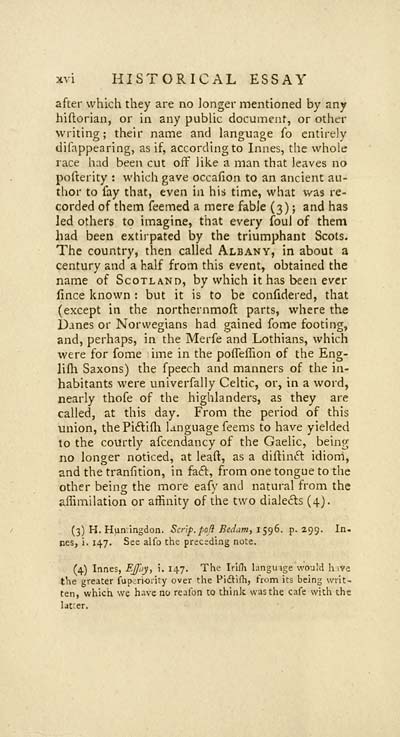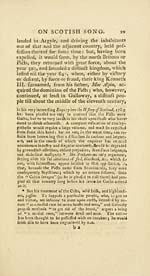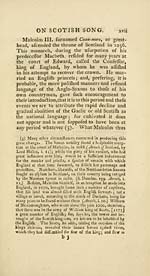Inglis Collection of printed music > Printed music > Scottish songs > Volume 1
(24) Page xvi
Download files
Complete book:
Individual page:
Thumbnail gallery: Grid view | List view

xvi HISTORICAL ESSAY
after which they are no longer mentioned by any
hiftorian, or in any public document-, or other
writing; their name and language fo entirely
difappearing, as if, according to Innes, the whole
race had been cut off like a man that leaves no
pofterity : which gave occafion to an ancient au-
thor to fay that, even in his time, what was re-
corded of them feemed a mere fable (3) ; and has
led others to imagine, that every foul of them
had been extirpated by the triumphant Scots.
The country, then called Albany, in about a
century and a half from this event, obtained the
name of Scotland, by which it has been ever
fince known : but it is to be confidered, that
(except in the northernmoft parts, where the
Danes or Norwegians had gained fome footing,
and, perhaps, in the Merfe and Lothians, which
were for fome ime in the poffeflion of the Eng-
lifh Saxons) the fpeech and manners of the in-
habitants were univerfally Celtic, or, in a word,
nearly thofe of the highlanders, as they are
called, at this day. From the period of this
union, thePicYifh language feems to have yielded
to the courtly afcendancy of the Gaelic, being
no longer noticed, at lead, as a diftinct. idiom,
and the tranfition, in fact, from one tongue to the
other being the more eafy and natural from the
affimilation or affinity of the two dialects (4).
(3) H. Huntingdon. Scrip, pofi Bedam, 1 596. p. 299. In-
nes, i. 147. See alfo the preceding note.
(4) Innes, EJJliy, i. 147. The Irifli language would hiVe
the greater fupertarity over the PicYifh, from its being writ-
ten, which we have no reafon to think was the cafe with the
latter.
after which they are no longer mentioned by any
hiftorian, or in any public document-, or other
writing; their name and language fo entirely
difappearing, as if, according to Innes, the whole
race had been cut off like a man that leaves no
pofterity : which gave occafion to an ancient au-
thor to fay that, even in his time, what was re-
corded of them feemed a mere fable (3) ; and has
led others to imagine, that every foul of them
had been extirpated by the triumphant Scots.
The country, then called Albany, in about a
century and a half from this event, obtained the
name of Scotland, by which it has been ever
fince known : but it is to be confidered, that
(except in the northernmoft parts, where the
Danes or Norwegians had gained fome footing,
and, perhaps, in the Merfe and Lothians, which
were for fome ime in the poffeflion of the Eng-
lifh Saxons) the fpeech and manners of the in-
habitants were univerfally Celtic, or, in a word,
nearly thofe of the highlanders, as they are
called, at this day. From the period of this
union, thePicYifh language feems to have yielded
to the courtly afcendancy of the Gaelic, being
no longer noticed, at lead, as a diftinct. idiom,
and the tranfition, in fact, from one tongue to the
other being the more eafy and natural from the
affimilation or affinity of the two dialects (4).
(3) H. Huntingdon. Scrip, pofi Bedam, 1 596. p. 299. In-
nes, i. 147. See alfo the preceding note.
(4) Innes, EJJliy, i. 147. The Irifli language would hiVe
the greater fupertarity over the PicYifh, from its being writ-
ten, which we have no reafon to think was the cafe with the
latter.
Set display mode to: Large image | Transcription
Images and transcriptions on this page, including medium image downloads, may be used under the Creative Commons Attribution 4.0 International Licence unless otherwise stated. ![]()
| Special collections of printed music > Inglis Collection of printed music > Printed music > Scottish songs > Volume 1 > (24) Page xvi |
|---|
| Permanent URL | https://digital.nls.uk/94587408 |
|---|
| Shelfmark | Ing.62 |
|---|---|
| Additional NLS resources: | |
| Attribution and copyright: |
|
| Description | In two volumes. |
|---|---|
| Shelfmark | Ing.62-63 |
| Description | Scottish and English songs, military music and keyboard music of the 18th and 19th centuries. These items are from the collection of Alexander Wood Inglis of Glencorse (1854 to 1929). Also includes a few manuscripts, some treatises and other books on the subject. |
|---|
| Description | The Glen Collection and the Inglis Collection represent mainly 18th and 19th century Scottish music, including Scottish songs. The collections of Berlioz and Verdi collected by bibliographer Cecil Hopkinson contain contemporary and later editions of the works of the two composers Berlioz and Verdi. |
|---|

